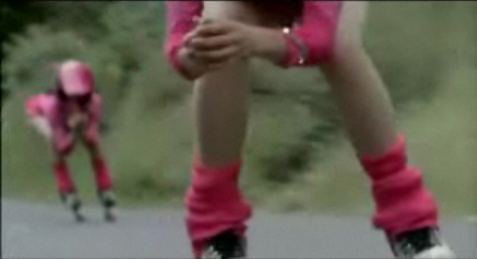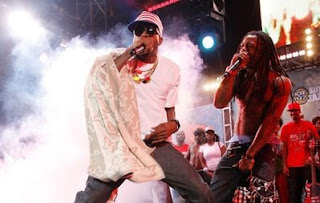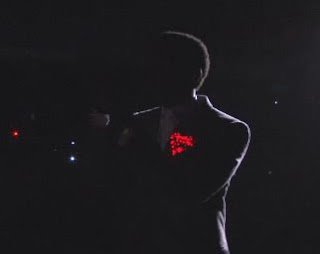 The focus on Kanye West and Lil Wayne as “post-lyrical” rappers and for the sake of simplification, the post-lyrical rappers, is due to both their popularity and favorable critical reception. They also transcend or just don’t fuck around with a lot of the cliches of rap (although they’re slowly building a whole new group of cliches for future rappers) and so, the moral quandaries about crime glorification and all that mostly doesn’t apply to either of these guys, while say, a discussion about Young Jeezy (certainly post-lyrical) would be hard to go into without sort of discussing that stuff.
The focus on Kanye West and Lil Wayne as “post-lyrical” rappers and for the sake of simplification, the post-lyrical rappers, is due to both their popularity and favorable critical reception. They also transcend or just don’t fuck around with a lot of the cliches of rap (although they’re slowly building a whole new group of cliches for future rappers) and so, the moral quandaries about crime glorification and all that mostly doesn’t apply to either of these guys, while say, a discussion about Young Jeezy (certainly post-lyrical) would be hard to go into without sort of discussing that stuff.
Yes, Wayne might fall into the “crack rap” category but his work, especially as of the past few years, seems less interested in it and drug dealing’s only invoked as some fucked-up foggy memory from his teens or a violent/drug-dealing threat/boast is now used to exemplify his strength and power as a rapper. Like Chuck D. saying his “uzi weighs a ton” or something, it’s a boast about skills transferred onto well-worn rap cliches.
Kanye of course, has never dealt with raps about drugs and violence and has wisely balanced a persona based on his lack of experience/familiarity with “the life” with a persona that doesn’t remind listeners every few minutes that he indeed, does not rap about those things. This doesn’t make these guys “better” than rappers following the “Nas formula”–indeed, Wayne falls back on gun talk when he feels like it and Kanye’s got plenty of clothes and shoe references to keep him afloat–it just makes them different.
Their basic eschewing of violence and/or relative refusal to fall back on well-worn rap cliches is something of a return to the “Native Tongues” stuff. The main focus for Kanye and Wayne is fun and an all-encompassing need to stand-out. Sure, it doesn’t have the hyper-explicit politics of the Tongues who indeed, wanted to stand out in part, to oppose (what we now call) “gangsta rap” but part of critical and popular embrace of my post-lyrical posterboys is that they bring a rarified and individual voice back to hyper-corporatized hip-hop. Whether you like them or not, Kanye and Wayne are very strange and very unpredictable pop stars.
In the first part of this, Noz asked me how De La Soul didn’t engage in the same kind of “weirdo wordplay” that I connected to the post-lyricists or to my super-obvious examples of Kool Keith and Grand Puba. The short answer is, De La Soul do engage in that kind of wordplay (and do it better). The slightly longer answer is, De La Soul are total fucking geniuses and completely transcend whatever era or trend or whatever me or any other dopey rap pseudo-scholar sticks them in. The long answer is, De La Soul do the weirdo wordplay game, but they do it within the frame of conventional, metered, rhyming raps. They are technically proficient, lyrically smart, and purposefully sloppy as well. De La Soul’s wordplay still fits within the expected understanding of “rap” and “rapping” while Kanye and Wayne don’t always do that and it seems, their fans and detractors sometimes have a hard time defining what exactly these guys do on the mic.
This is interesting because when both of them started out, Kanye and Wayne were fairly conventional rappers. Like most trends or slowly-gestating almost-trends, the guys that best exemplify or represent the trend are to some extent, bandwagon jumpers. While snobs and nostalgics will completely dismiss the rapping on The College Dropout and Late Registration as not very good–arguing about technical ability is a waste of time and a task that will never result in full agreement– there’s undoubtedly a significant shift in Kanye’s rapping on the first two albums when compared to Graduation. His flow is significantly slowed-down (something I think, he swiped from post-retirement Jay-Z, which makes this whole thing way more complicated) and his focus went from funny punchlines and rap references to near-nonsense word-association. Example: “They got the CD, then got to see me/Drops gems [pronounced like "Gym"] like/I dropped out of P.E”.
Lil Wayne has always been a very good rapper, even when he was like, fourteen. The critic-created story arc of his rapping career was developed by a bunch of dudes that never heard anything he did before Tha Carter and made jokes about CASH-MONEY, but retroactively bought all those CDs for 6 bucks used and pretend like they’ve been bumping Tha G-Code since 1999. Wayne has always been something of a throwback–or was before his mixtape blitz which radically changed his style–and even in the Hot Boys, he was doing the Nas formula by way of his more immediate Southern influences, while Juvenile (a very good rapper too) is strictly or mostly “Southern”. Wayne’s “mixtape” flow on the other hand, grew increasingly odd and experimental and strayed ever further from the “Nas formula”.
The medium of the mixtape allowed Wayne a place to do whatever he wanted and the availability of these mixtapes, coupled with the hyper-immediacy of the internet allowed direct, non-corporate/non-audience-tested feedback about these “songs”. Listening to the Wayne of “Georgia Bush” now sounds quantifiable when compared to the Wayne of the stuff on Drought 3 or Carter 3 (or at least, the weirder parts of Carter 3). Example: “They cannot see [Nazi] me/Like Hitler”.
There’s also a lot more conventional melody in Kanye’s songs and more than enough singing and crooning in much of Wayne’s work. This too, has always been a part of their work, Dropout in particular, succeeded beyond being a weird, “conscious” rap album (which is what it is) because Kanye’s melodies were all sung and performed by him and we, the listeners could carry a tune just as well. The sing-song feel of the album made it relate-able and memorable. Wayne’s flow has always been more melodic and bouncy. Undoubtedly, this is the result of being a Southern rapper and in Southern rap, conventional musicality is much more pervasive. In that sense, Wayne and Kanye are just bringing to the forefront a key part of their success because they now are famous enough that we’ll even eat up their auto-tune experiments and also because, popular music is way more ready for auto-tune experiments.
Which brings us to the next reason for post-lyricism: the changed pop music climate. The example that’s often referenced–and again, the one that every dumb Popular Music Prof will be using in thirty years–is Timbaland, particularly the baby sample in Aaliyah’s “Are You That Somebody”. In Timbaland and that beat in particular, so many of the trends that now pervade pop, R & B, and rap can be traced: weird merging of experimentalism with straight-forward dance music, electronics over instrumentation and/or sampling, the Southern rap takeover, a weird Futuristic aesthetic, etc. The “Nas formula” just doesn’t work as well over top of skittering synths and rave-ready drums (look no further than “Hero” by Nas as proof) and so, as the sound of the music-makers changed, so did the raps put over that music. That’s not to say auto-tune warbling or half-rhyming raps sound all that good over electronic beats either, but it makes a lot more sense.
Additionally, there’s more music in the beats of Timbaland, the Neptunes, etc. Once again, this has a lot to do with the South’s musical influence on rap. The open spaces in the beats fit the open space of the South’s landscape, the South’s rich musical history coupled with a more laid-back, relative lack of New York hustle and bustle, encourages the playing and mastering of musical instruments, and the importance of the church and church music in Southern communities makes so much of the black Southern population keenly aware of musicality. Singing and melody made their way into the raps and rhymes and slowly, through guys like Timbaland (and many, many, many others that will get lost in the shuffle that simplifies music history for textbooks), this all wormed its way into the pop landscape. Rapping tightly constructed rhymes (with or without nonsense style wordplay) and then getting a crew of dudes to shout a hook just doesn’t work over the sounds constructed by the new guard of rap producers.
 The latest “beat drop” from Metal Lungies uh, dropped. My beats were: “Tical” (Method Man), “North Star (Jewels)” (Raekwon), “Reunited” (off Forever), and “No Said Date” (Masta Killa):
The latest “beat drop” from Metal Lungies uh, dropped. My beats were: “Tical” (Method Man), “North Star (Jewels)” (Raekwon), “Reunited” (off Forever), and “No Said Date” (Masta Killa):
 The focus on Kanye West and Lil Wayne as “post-lyrical” rappers and for the sake of simplification, the post-lyrical rappers, is due to both their popularity and favorable critical reception. They also transcend or just don’t fuck around with a lot of the cliches of rap (although they’re slowly building a whole new group of cliches for future rappers) and so, the moral quandaries about crime glorification and all that mostly doesn’t apply to either of these guys, while say, a discussion about Young Jeezy (certainly post-lyrical) would be hard to go into without sort of discussing that stuff.
The focus on Kanye West and Lil Wayne as “post-lyrical” rappers and for the sake of simplification, the post-lyrical rappers, is due to both their popularity and favorable critical reception. They also transcend or just don’t fuck around with a lot of the cliches of rap (although they’re slowly building a whole new group of cliches for future rappers) and so, the moral quandaries about crime glorification and all that mostly doesn’t apply to either of these guys, while say, a discussion about Young Jeezy (certainly post-lyrical) would be hard to go into without sort of discussing that stuff. Rappers aren’t rapping anymore. That’s not the grumble of an old-school fan or knee-jerk disappointment upon hearing say the Kanye/Lil Wayne/Jay-Z/T.I track “Swagger Like Us” or the rap-less “Love Lockdown”, it’s just a fact. Most of radio’s rappers are doing as much singing or club-ready chanting as rapping, and the few guys still rapping are layover from the late 90s/early 2000s or are named Lil Wayne and Kanye West-and the “talents” of those two are for some reason, still up to debate.
Rappers aren’t rapping anymore. That’s not the grumble of an old-school fan or knee-jerk disappointment upon hearing say the Kanye/Lil Wayne/Jay-Z/T.I track “Swagger Like Us” or the rap-less “Love Lockdown”, it’s just a fact. Most of radio’s rappers are doing as much singing or club-ready chanting as rapping, and the few guys still rapping are layover from the late 90s/early 2000s or are named Lil Wayne and Kanye West-and the “talents” of those two are for some reason, still up to debate. David Foster Wallace hanged himself at some point on Friday. He wasn’t “one of the best writers of his generation” or any of that eulogy stuff, he was the ONLY writer.
David Foster Wallace hanged himself at some point on Friday. He wasn’t “one of the best writers of his generation” or any of that eulogy stuff, he was the ONLY writer. Were his dogs in the house? Did he stick them outside or on the porch or something? As he undoubtedly dangled for awhile, were they barking? He would’ve realized the absurdity of that. I’m not saying it would or should’ve stopped him–the time I tried to kill myself, The Harder They Come OST was playing in my car and I realized this was sort of funny and absurd, but I was alone, so I could ignore the absurdity and not be embarrassed; beyond-palpable feelings of embarrassment are a big reason why people kill themselves–but no doubt, Wallace would’ve thought about these things. His non-fiction especially, showed that he wasn’t the kind of big-brain that could turn it off or adjust it. Why Kafka was funny, David Lynch, tennis, or the Adult Video News award all got approached the same way.
Were his dogs in the house? Did he stick them outside or on the porch or something? As he undoubtedly dangled for awhile, were they barking? He would’ve realized the absurdity of that. I’m not saying it would or should’ve stopped him–the time I tried to kill myself, The Harder They Come OST was playing in my car and I realized this was sort of funny and absurd, but I was alone, so I could ignore the absurdity and not be embarrassed; beyond-palpable feelings of embarrassment are a big reason why people kill themselves–but no doubt, Wallace would’ve thought about these things. His non-fiction especially, showed that he wasn’t the kind of big-brain that could turn it off or adjust it. Why Kafka was funny, David Lynch, tennis, or the Adult Video News award all got approached the same way. “Lauryn Hill said her heart was in Zion/I wish her heart still was in rhyming/Cause who the kids gonna listen to/ Huh? I guess me if it isnt you.”
“Lauryn Hill said her heart was in Zion/I wish her heart still was in rhyming/Cause who the kids gonna listen to/ Huh? I guess me if it isnt you.” If you get a chance, please check out the new comics blog Are You a Serious Comic Book Reader?, written by myself and five of my friends. Expect shorter, more frequent posts–at least a few every day–but the same general attitude and critical eye. We’re kicking things off with a feature called the “Better Than List”, swiped from Armond White’s year-end movie wrap-ups but instead, we’re taking a close look at the comics canon and shitting on the ones that don’t really deserve the hype.
If you get a chance, please check out the new comics blog Are You a Serious Comic Book Reader?, written by myself and five of my friends. Expect shorter, more frequent posts–at least a few every day–but the same general attitude and critical eye. We’re kicking things off with a feature called the “Better Than List”, swiped from Armond White’s year-end movie wrap-ups but instead, we’re taking a close look at the comics canon and shitting on the ones that don’t really deserve the hype. The boner-kill feeling that’s spread across the internet when “Swagger Like Us” wasn’t the event record of the year–or really an event record at all–isn’t a surprise, but it’s unfortunate because it’s closed too many ears to one of the weirder and rewind-able songs in quite some time. “Swagger’s not ready for the club and it won’t get the real head’s heads’ bopping either; it’s a truly out-there song from really, the only four rappers that still sell records and even sort of give a shit about rapping or artistry. They just also happen to four of the most delusional, navel-gazing performers around; stuff is complicated like that.
The boner-kill feeling that’s spread across the internet when “Swagger Like Us” wasn’t the event record of the year–or really an event record at all–isn’t a surprise, but it’s unfortunate because it’s closed too many ears to one of the weirder and rewind-able songs in quite some time. “Swagger’s not ready for the club and it won’t get the real head’s heads’ bopping either; it’s a truly out-there song from really, the only four rappers that still sell records and even sort of give a shit about rapping or artistry. They just also happen to four of the most delusional, navel-gazing performers around; stuff is complicated like that.